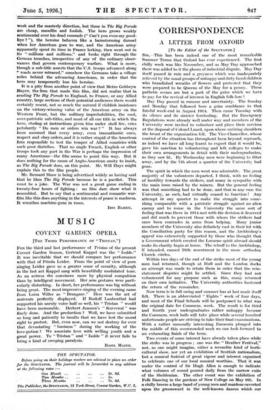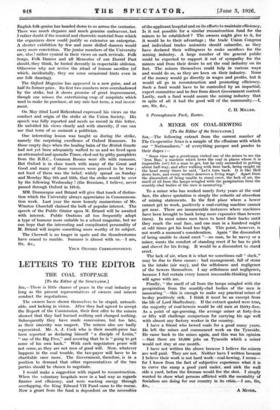CORRESPONDENCE
A LETTER FROM OXFORD
[To the Editor of the SPECTATOR.] Sia,—This has been indeed one of the most remarkable Summer Terms that Oxford has ever experienced. The first chilly week was like November, and as May Day approached there was added to it the gloom of industrial dispute. May Day itself passed in rain and a greyness which was inadequately relieved by the usual groups of unhappy and dirty faced children who brandished wreaths of flowers and protested that they were prepared to be Queens of the May for a penny. These pathetic scenes are but a part of the price which we have to pay for the revival of interest in English folk-lore !
May Day passed in rumour and uncertainty. The Sunday and Monday that followed bore a grim semblance to that fateful week-end in August 1914. Then came Tuesday with its silence and its sinister foreboding. But the Emergency Regulations were already well under way and members of the University were invited to volunteer and place their services at the disposal of Colonel Luard, upon whose untiring shoulders the brunt of the organization fell. The Vice-Chancellor, whose control of the situation has throughout been beyond reproach, as indeed we have all long learnt to expect that it would be, gave his sanction to volunteering and left colleges to make their own arrangements in detail with their undergraduates, as they saw fit. By Wednesday men were beginning to filter away, and by the 7th about a quarter of the University had gone.
The spirit in which the men went was admirable. The great majority of the volunteers departed, I think, with no feeling of hostility towards the strikers, and many in sympathy with the main issue raised by the miners. But the general feeling was that something had to be done, and that in any case the University, as such, had virtually ceased to function ! Any attempt in any quarter to make the struggle into some- thing comparable with a patriotic struggle against an alien enemy and to rouse in the University the same sort of feeling that was there in 1914 met with the derision it deserved and did much to prevent those with whom the strikers had once been comrades in arms from helping. Many junior members of the University also definitely cast in their lot with the Conciliation party for this reason, and the Archbishop's appeal was extensively supported by those who thought that a Government which created the Locarno spirit abroad should make its charity begin at home. The rebuff to the Archbishop, if intended, caused little resentment in the more orthodox Church circles.
Within two days of the end of the strike most of the young men had returned, though at Hull and the London docks an attempt was made to retain them in order that the rein- statement disputes might be settled. Since they had not volunteered for any purpose such as this, many returned on their own initiative. The University authorities hastened the return of the remainder.
Now term is in full swing and summer has at last made itself felt. There is an abbreviated " Eights " week of four days, and most of the Final Schools will be postponed to what was the original date for Commem. week. The result is for third and fourth year undergraduates rather unhappy because the Commem. week balls will take place while several hundred unfortunate people are striving to take their final examinations. With a rather unusually interesting Encaenia plunged into the middle of this overcrowded week we can look forward to an exhausting finish of the term. Two events of some interest have already taken place while the strike was in progress ; one was the " Heather Festival," not, as one might imagine, either a recondite kind of horti- cultural show, nor yet an exhibition of Scottish nationalism, but a musical festival of great vigour and interest organized to celebrate one of our local musical worthies. That it was under the control of Sir Hugh Allen is enough to indicate what volumes of sound poured daily from the narrow exits of the Sheldonian. The other event was the exhibition of Folk Dancing in the gardens of New College on May 8th. In chilly breeze a large band of young men and maidens cavorted upon the greensward in the well-known dances which our English folk-genius has handed down to us across the centuries. There was much elegance and much genuine endeavour, but I rather doubt if the musical and choreutic material from which the organizers drew could justify so extensive an enterprise. A shorter exhibition -by -few and more skilled dancers would carry more conviction. The junior members of the University are, alas ! rather cynical in their views on such revivals. Folk Songs, Folk Dances and all Memories of our Horrid Past should, they think, be buried decently in respectable oblivion. Otherwise why not revive the ritual of human sacrifice (of which, incidentally, they see some occasional hints even in our folk dancing).
The Oxford Magazine has appeared in a new guise, and at half its former price. Its first two numbers were overshadowed by the strike, but it shows promise of great improvement, though one misses the entertaining crop of misprints which used to make its purchase, at any rate last term, a real invest- ment.
On May 22nd Lord Birkenhead expressed his views on the conduct and origin of the strike at the Union Society. His speech was fully reported and needs no record in this letter. He unfolded his views clearly and with sincerity, if one can use that term of so eminent a politician.
One interesting lesson was taught us during the strike, namely the surprising excellence of Oxford Rumours. In those empty days when the healing balm of the British Gazette had not yet been adequately wafted to us and we lived upon an attenuated and sporadic Times, eked out by pithy pamphlets from the B.B.C., Common Rooms were rife with rumours. But Oxford is in close touch with many of the Great and Good and many of those rumours were proved to be true ; not least of them was the belief, widely spread on Sunday and Monday May 9th and 10th, that the strike would be over by the following Wednesday ! (the Russians, I believe, never passed through Oxford in 1914).
MM. Doumerg,ue and Briand will give that touch of distinc- tion which the University always appreciates in Commemora- tion week. Last year the more homely mannerisms of Mr. Winston Churchill claimed the bulk of popular interest. The speech of the Public Orator upon M. Briand will be awaited with interest. Public Orations all too frequently adopt a type of humour more suitable to a school magazine, but we can hope that the interesting and complicated personality of M. Briand will inspire something more worthy of its subject.
The Cherwell is no longer in spate and the thunderstorms have ceased to nimble. Summer is almost with us.—I am, Sir, &c.,
YOUR OXFORD CORRESPONDENT.











































 Previous page
Previous page